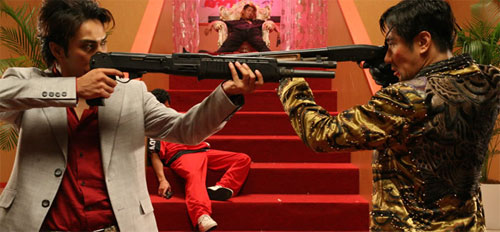I recently had the chance to check out Yakuza: Like a Dragon, a live-action movie adaptation of the first Yakuza game directed by Takeshi Miike. It should be noted that this film is apparently quite liberal in its retelling of the first game: though a decision not necessarily problematic in itself it merits noting perhaps for some fans. After doing so, I’d like to talk a bit about my experience with the movie and perhaps use it as a springboard for discussion.
I would also like to note that the extent of my direct exposure to the first Yakuza game lie with the summary of that game’s plot in Yakuza 3. Hit the break to read more! Be warned that while I do try to avoid spoiling the movie too heavily, I do refer to some spoilers in a general or vague way. Discussing spoilers openly in the comments section or on our forums is totally fine, however.
Having established that disclaimer, I had fun watching it. The movie opens on a sweltering night in Kamurocho, with a duo of buffoonish criminals holding up a bank, only to find that most all of its available cash has been taken out. This withdrawn money is the 10 billion yen central to the narrative: it belongs to the Tojo Clan, a leading Yakuza group. This is a creative and smart way of introducing that plot point. It’s humorous too. Expect to see them occasionally throughout the movie, mostly for light comic relief. They exemplify what I understand to be the typical Yakuza “random encounter”: boisterous and overconfident, yet harmless in spite of their position and threats due to incompetence.
A police force assembles nearby to neutralize the above duo’s threat, as they’ve taken all of the bank’s staff working that night as hostages. Similarly they function as comedic relief; they function as a herd, are in-the-dark and behave reactively. It’s also worth noting that the police force spend virtually all of their time in the same room watching for developments on the hostage situation in the bank. This is logical, but from the perspective of myself as a part of the audience, it reminds me of how predictable their role is, and the humor is mostly mild too. The only legitimate police character is Makoto Date; this is reflected in the way he carries himself and his non-combative relationship with Kiryu, with Kiryu being the moral focal point of the show.
Speaking of which, let’s talk about Kazuma Kiryu and Haruka. They share similar goals and have a symbiotic relationship, and their dynamic is totally believable and mostly heartwarming. But the problem is there is so much else going on in the movie that their struggle is overshadowed. The writers had to know they were in a bind; strictly retelling the first game might not excite moviegoers looking for something new and might bore those already familiar with events of the first game (“why do I want to watch the same thing in movie form?”, etc.).
But towards the goal of injecting life into the movie, I feel like they overstuffed it a little. Kiryu and Haruka’s goal is overshadowed because it’s not as colorful as the subplots attached to the movie, regardless of their significance. It’s not like Kiryu’s stoicism is an obstacle to empathizing with him, and there are a couple of scenes of him with Haruka that show off his good side. It’s just that his victory always comes across as a foregone conclusion; he never seems in any real danger here, so you don’t have to be worried. This is the flipside consequence of the incompetent goons he fights, though ultimately it’s not too big of a detractor from enjoying the movie.
There is yet another subplot involving the pair of young twenty-somethings who suddenly go on a stealing spree to hoist as much money as they can. It sounds a little better than one might initially expect: a bratty and impetuous girl leads around the devoted, subordinate, but still ethically aware guy. They go deeper and deeper, stealing more and more, buying a weapon. Though their personalities aren’t endearing (and the reveal of their motivations is astonishingly flat,) the movie does a good job of showing how in over their heads they are. It prompted me to think about what separated these “greenhorns” from the hardened people in the Yakuza universe who are able to survive in the dark side of Kamurocho consistently. Is it merely time, the right circumstances, personality, protection from someone else more powerful? The movie doesn’t say, I suppose it’s left for the viewer to decide. While I feel that a little too much time was given to these characters, I think that the resolution of their arc was spectacular, most notably the final shots involving the characters. It was a powerful scene.
With all of these goings-on and more, it’s to the point where the ending of the movie can’t help but feel rushed. The main villain is handled awkwardly. He isn’t given real attention until the final confrontation at the Millennium Tower. Sure, the adventure is more about Kazuma and Haruka looking for Haruka’s mother and the movie actually portrays the villain as having a sense of power compared to other fights by successfully wailing on Kazuma. Compare this to the punks that Kiryu dispatches with ease, or the delicate balance of can’t-quite-catch-up and formidable opponent that his relationship Majima represents in the film. It doesn’t detract from the fight being underwhelming and astoundingly short. It’s the only real moment of climax this movie has and it falls flatter than it should. The subplots, since they are so many and given so much comparative attention, partially deflate the gravity of this climax. I will admit that the director, realizing that the movie has gone on for a long time at this point, found a fairly clever way to end the fight while paying a nod to how the games work. This was a particular “trick” or “resource” that he hadn’t employed thus far and because of its execution, it comes across as funny and clever.
There were a variety of small touches this movie handled well. The SEGA shoutouts in the form of the printed logos, though sometimes requiring an eagle eye, were fun easter eggs. You even see Toshihiro Nagoshi in the movie a few times, up to no good. I also think questions of drama aside, the fight sequences were shot and handled well. Fights are surprisingly fast and sometimes a lot happens in one take. There is a great tone-sensitivity, an ability to decide when to make the fights comedic and when to focus on the action. One quality that’s always surprised me about Yakuza from what little I’ve seen of the games is how it manages to make you think all of its over the top elements make complete sense in its own world. Yakuza have been known to use baseball bats (at least, in certain points in history, as far as I know) but Majima’s super swings and Kiryu’s poses don’t seem ridiculous as they should. I’d like to add that it seems as if the movie sets up the events of the second game, but my knowledge of the names and lore involved in the first two games isn’t all that robust.
All of this being said, it’s worth checking out. Well-done action, the occasional moment of dramatic power, a believably constructed world, and the content spanning various tones and characters (much as I think it also subtracted from the movie to a degree) fill this generous movie and make an argument for your attention.

